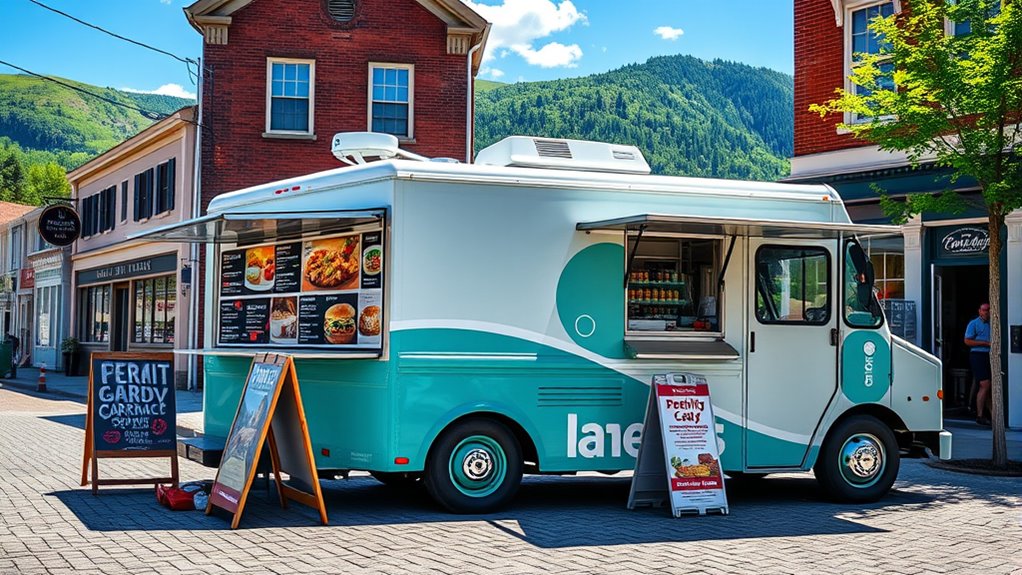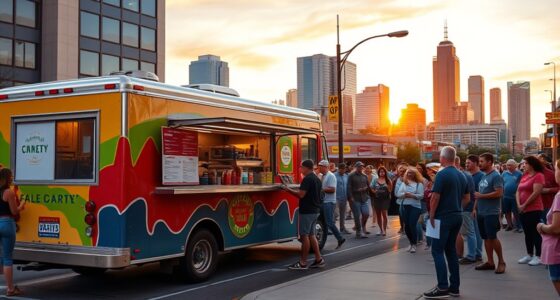To open a food truck in Rutland, Vermont, you’ll need to secure permits like a Food Service Establishment License (~$140), a Business License, and possibly temporary event permits. Budget for costs such as vehicle expenses, utilities, and licensing fees, and choose busy locations like downtown or near transit hubs. Craft a compliant menu featuring portable, safe foods, and boost visibility with social media and local partnerships. If you continue along, you’ll learn how to navigate each step successfully.
Key Takeaways
- Obtain necessary permits including a Food Service Establishment License (~$140) and Temporary Food License for events, with proper application timelines.
- Budget for licensing fees, utilities, maintenance, and unexpected repairs, and choose high-traffic, accessible locations like Downtown or near Rutland Transit Center.
- Develop a compliant menu focusing on portable, safe items that meet Vermont food safety standards, avoiding home-prepared meats outside cottage laws.
- Use social media and location-based advertising to promote your truck, engage customers, and build community partnerships for steady demand.
- Ensure ongoing compliance with health regulations, maintain accurate records, post licenses visibly, and prepare for regular health inspections.
Navigating the Permitting Process and Licensing Requirements
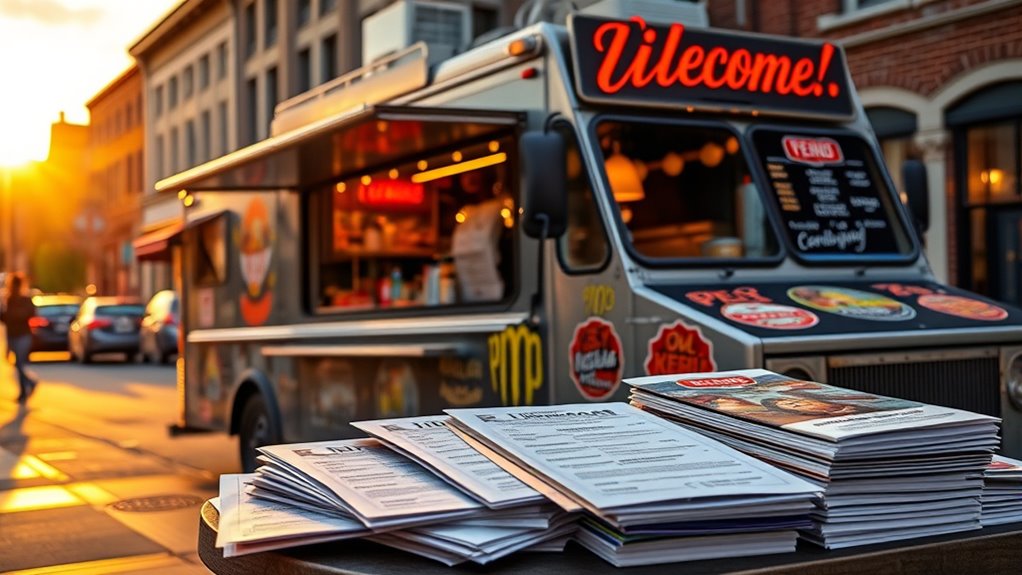
Understanding the permitting process and licensing requirements for a food truck in Rutland, Vermont, involves understanding several key steps. First, you need a Food Service Establishment License, which covers retail food operations. You’ll also need to apply for a Business license, including a $30 fee for a background check, valid from May 1 to April 30. The application requires details about your operation, water and sewage systems, and opening date, with a review taking around 30 days. If you plan to operate at temporary events, a Temporary Food Service License is necessary, submitted at least 15 days prior. Local permits from the Rutland authorities, including approval from the Board of Aldermen for liquor or entertainment, are also essential. Ensuring compliance with health and safety inspections is vital to keep your business running smoothly. Additionally, understanding regulations governing mobile food units can help you stay compliant with state and local laws.
Estimating Costs and Managing Budget for Your Food Truck
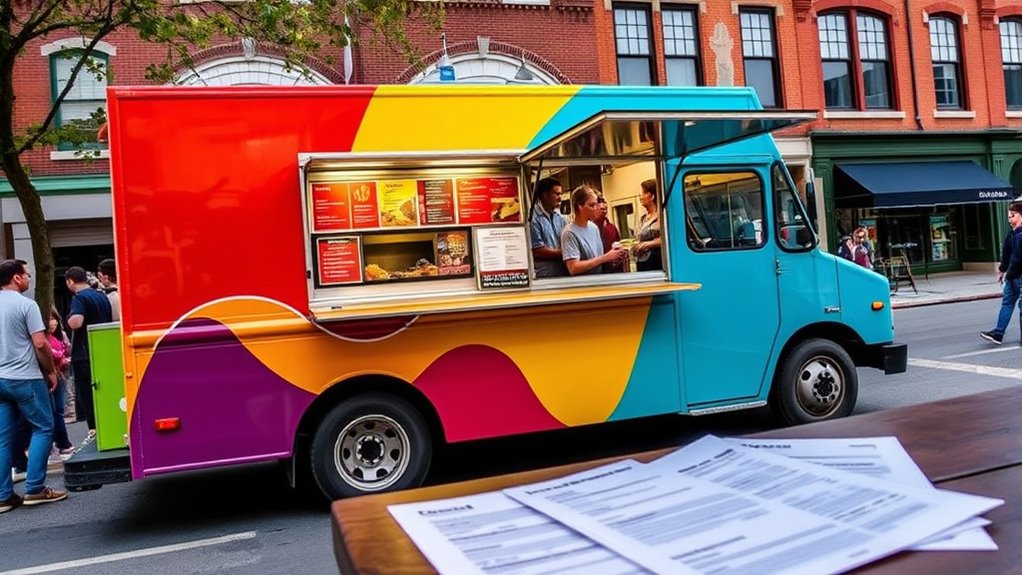
Understanding your costs is essential to launching your food truck in Rutland. You’ll need to account for licensing and permit fees, along with ongoing expenses like fuel, maintenance, and staffing. Managing these budgets carefully helps guarantee your business stays profitable and sustainable. Being aware of local permit costs can help you plan accordingly and avoid unexpected expenses down the line. Additionally, familiarizing yourself with bank SWIFT/BIC codes can facilitate secure financial transactions, especially if you plan to handle payments or international supplier payments efficiently.
Licensing and Permit Fees
Estimating licensing and permit fees is essential for managing your food truck’s budget effectively. In Vermont, you’ll need a Food Service Establishment License, costing around $140 for limited operations. Depending on your setup, you might also require a Commercial Caterer License or a Retail Food Establishment license. If you plan to serve at events under 14 days, a Temporary Food Service License is necessary, with no application fee but timely submission required. You may also need permits for wastewater, water supply, fire safety, and other local regulations. Additionally, fees for liquor licenses, if applicable, are separate. While Vermont doesn’t have a general business license fee, registering for sales tax and obtaining a federal EIN are mandatory, with minimal costs. Licensing requirements can vary based on your specific location and operations, so it’s advisable to consult local authorities early in your planning process to ensure compliance. It’s also important to consider projected costs for ongoing permits and compliance to stay within your budget. Budget accordingly for these essential permits to keep your expenses on track.
Operational and Maintenance Expenses
Managing your food truck’s operational and maintenance expenses is key to keeping your business profitable. These costs include fuel, utilities, and routine repairs that keep your truck running smoothly. Fuel costs depend on truck size, engine type, and local gas prices, typically ranging from $300 to $700 per month. Utility expenses, like water, waste disposal, and electricity, can add up, along with Wi-Fi and POS system fees of $50 to $150 monthly. Regular maintenance—oil changes, tire rotations, and equipment servicing—costs about $200 to $400 monthly. Unexpected repairs may occur, so budgeting 5-10% of monthly revenues helps manage surprises. Keep these costs in check to ensure your food truck stays profitable and well-maintained. Monitoring fuel efficiency can help reduce overall fuel expenses. Incorporating preventive maintenance practices can extend the lifespan of your equipment and avoid costly breakdowns. – Fuel, utility, and Wi-Fi expenses – Routine maintenance and repairs – Unexpected repair contingency fund – Equipment upkeep and cleanliness
Identifying Prime Locations in Rutland for Your Food Truck
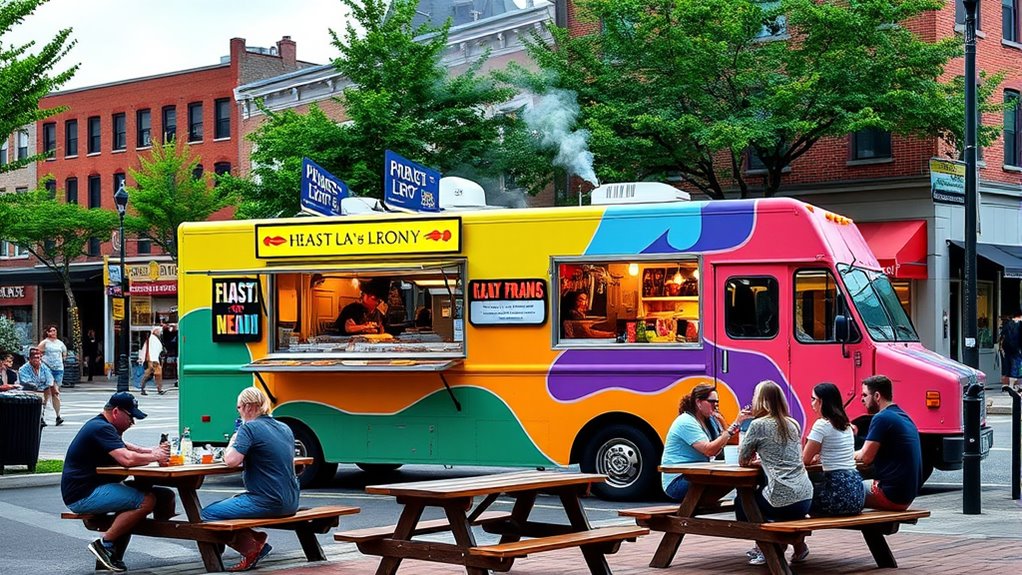
To succeed with your food truck in Rutland, you need to focus on high foot traffic areas like downtown and near major event venues. Securing permits for seasonal events and festivals can boost your visibility during busy times. Additionally, choosing strategic parking spots close to busy streets and popular attractions guarantees convenient access for customers. Following Facebook updates can also help you identify the best times and locations for events and peak foot traffic. For added success, consider the availability of nearby local dining options that attract visitors and create opportunities for cross-promotion.
High Foot Traffic Areas
Where should you position your food truck in Rutland to attract the most customers? The best spots are areas with high pedestrian foot traffic and easy access.
- Center Street: With over 1,300 pedestrians daily and outdoor dining expansions, it’s a prime spot for visibility. Recent traffic pattern changes on Woodstock Avenue and North Main Streets aim to improve pedestrian connectivity, making this area even more accessible once completed.
- Downtown Commercial Zones: Streets like Merchants Row and West Street feature wide sidewalks, crosswalks, and frequent foot traffic from shoppers and commuters.
- Proximity to Rutland Transit Center: Access to parking garages increases foot traffic and visibility.
- Major Traffic Corridors: Woodstock Avenue and North Main Street are high-traffic routes with plans to improve pedestrian connectivity, making them promising locations once upgrades are finished.
Targeting these high-foot-traffic zones guarantees you maximize exposure and attract steady customers.
Event Permitting Opportunities
Looking to maximize your food truck’s visibility in Rutland? Organizing events offers prime opportunities. You’ll need a Special Event Permit, which involves submitting details like location, dates, expected attendance, and advertising plans. The permit review includes departments like Police, Fire, and Public Works, and you should attend the Board of Aldermen meeting for approval. For food service at events, secure a Temporary Food Service Establishment license at least 15 days prior, and display it visibly during the event. The license cycle runs from May 1st to April 30th, so planning ahead is essential to ensure your permits are current. Popular locations include municipal parks, community centers, public plazas, and seasonal festivals. Partnering with Downtown Rutland events or farmers’ markets can boost exposure. Remember to comply with health, safety, and tax regulations, ensuring a smooth, profitable event presence for your food truck. Additionally, understanding creative practice can help you develop innovative marketing strategies to attract more customers.
Strategic Parking Spots
Ever wondered which spots in Rutland can give your food truck maximum visibility and customer flow? To find the best parking spots, focus on high-traffic commercial areas, especially Downtown Rutland, near retail stores, offices, and public facilities. Proximity to public parking lots like the TD parking lot on Evelyn Street and the parking deck can boost customer access. Locations within mixed-use zones that allow food services simplify compliance. Nearby community facilities and large employers can ensure steady demand during peak hours. Additionally, the Vermont Farmers Market offers designated vendor spots that attract regional visitors, ensuring consistent sales. Remember to check zoning regulations, secure proper permits, and reserve parking spaces legally to maximize your truck’s visibility and accessibility. Considering cost and budgeting factors when choosing your location can help you plan effectively and ensure your food truck venture remains profitable.
Crafting a Menu That Meets Regulations and Attracts Customers
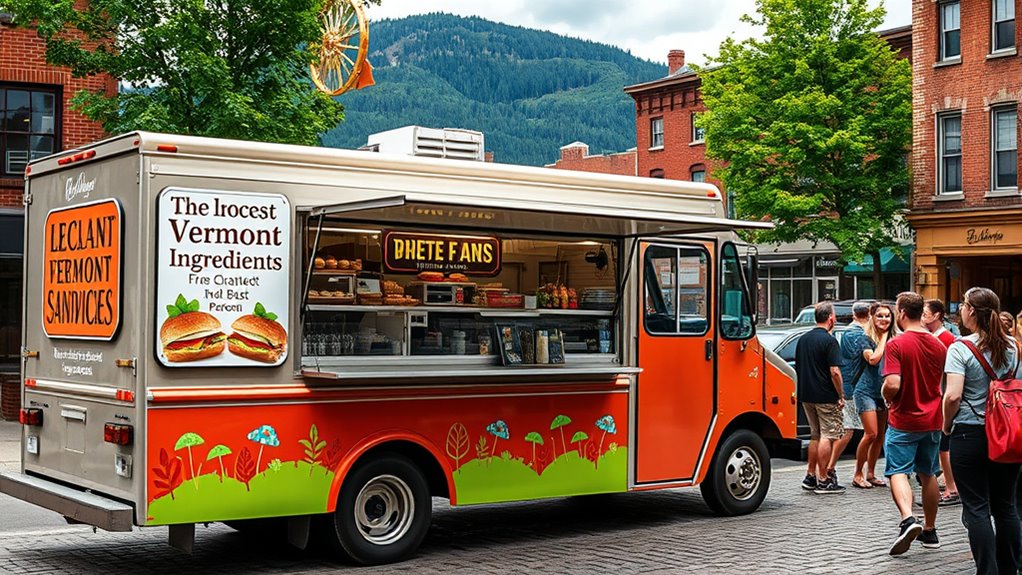
Crafting a menu for your Vermont food truck requires balancing customer appeal with strict regulatory compliance. You must select items that meet Vermont’s food safety standards, such as avoiding home-prepared meats unless under cottage laws. You should also consider the proper handling and storage of ingredients to prevent contamination and ensure freshness. All foods need proper wrapping and temperature controls—cold foods at 41°F or below and hot foods at 135°F or above. Focus on simple, portable options like cold sandwiches or steamed items, which align with your truck’s equipment. Be mindful of labeling requirements for cottage foods if you include homemade items, and keep sales within legal limits. Use food-grade packaging and maintain strict sanitation protocols. Food safety inspections are required before licensing, ensuring your menu complies with all health standards. By choosing compliant, appealing menu items, you’ll attract customers while adhering to Vermont’s health regulations, ensuring a smooth operation.
Implementing Effective Marketing Strategies in Rutland

To effectively attract customers in Rutland, implementing targeted marketing strategies is essential. You should leverage social media platforms like Facebook, Instagram, TikTok, and YouTube to showcase high-quality photos and videos of your food. Automate posts and manage ad campaigns using AI tools to maximize reach efficiently. Encourage customers to tag your truck and write reviews, boosting organic visibility through social proof. Use story features and live videos to give behind-the-scenes looks and real-time location updates, creating a sense of connection. Additionally, focus on location-based advertising with Google Ads and mobile apps like Truckster. Partner with local businesses and participate in events to expand your reach. Promotions, discounts, and a consistent visual identity will further solidify your presence in Rutland. Implementing community engagement initiatives can further enhance your local presence and foster customer loyalty. Moreover, utilizing cookies for targeted advertising can improve your marketing effectiveness and help you better understand your audience.
Ensuring Regulatory Compliance and Preparing for Inspections

Maintaining compliance with local and state regulations is key to running a successful food truck in Rutland. You need to secure a Retail Food License, which covers your operation, and a Temporary Food Service License if you participate in farmers markets or events for up to 14 days. Submit your applications at least 15 days before your first event, including all required documents and fees. Keep your licenses posted on your truck during operations. Stay compliant with Vermont health and safety standards by following proper food handling, storage, and sanitation practices. Be prepared for health inspections at any time. Ensure your insurance and liability coverage are current, and maintain accurate records of sales and permits. Proper preparation helps you navigate inspections smoothly and avoid penalties. Additionally, understanding best practices in food safety can help you maintain high standards and prevent violations during inspections.
Frequently Asked Questions
How Long Does the Permit Approval Process Typically Take in Rutland?
The permit approval process in Rutland typically takes around 30 days for a Food Service Establishment License, but it can differ. If you’re applying for temporary licenses or public assembly permits, expect at least 15 to 60 days, depending on the complexity and necessary public hearings. Be sure to submit complete applications promptly and respond quickly to any requests to avoid delays. Planning ahead helps ensure smoother approval timelines.
Are There Specific Health Inspections Unique to Food Trucks in Vermont?
You might worry about extra hurdles, but Vermont has clear health inspection standards for food trucks. You’ll undergo an initial inspection checking sanitation, water systems, and food handling. Be prepared to demonstrate proper waste disposal, cleanable surfaces, and hygiene practices. Regular inspections ensure ongoing compliance. Visualize your truck passing these checks — meeting Vermont’s health standards means smooth sailing, letting you focus on serving great food without surprises.
Can I Operate a Food Truck Year-Round in Rutland?
You can operate a food truck year-round in Rutland, but you’ll need to meet specific requirements. Obtain a retail food license, secure permission from property owners for your locations, and comply with health inspections. Weather challenges, like cold winters, require winterization adaptations such as heaters and sheltered service areas. Guarantee your permits are current and align with zoning laws, especially in downtown or busy areas with consistent foot traffic, to keep your business running all year.
What Are the Restrictions on Serving Alcohol From a Food Truck in Rutland?
You can’t serve alcohol from your food truck in Rutland without proper permits and adherence to local laws. You need a specific liquor license, including a beer and wine license, and must follow Vermont Liquor Control Board regulations. Serving alcohol is only allowed in approved private areas or designated events, not on public streets. You must avoid unauthorized zones, enforce restrictions, and guarantee compliance to prevent fines or license revocation.
How Can I Find Available Parking Spots That Meet Permit Requirements?
Imagine finding a hidden key to a secret garden—your perfect parking spot. To do that, you need to check the Vermont Farmers Market and city zoning maps, ensuring spots are approved for vendors. Visit Rutland’s zoning office or their website to verify land use rules. Remember, parking must comply with health and safety regulations, so always confirm with local authorities before settling in.
Conclusion
Starting your food truck journey in Rutland can be a rewarding adventure—think of it as your modern-day gold rush. By steering permits, managing costs, choosing prime spots, and crafting a tempting menu, you’re setting yourself up for success. Stay compliant and market smart. Remember, every great chef once faced challenges; with perseverance, you’ll carve out your own culinary legacy in this charming town. The road may be tough, but the flavor of victory is worth it.
